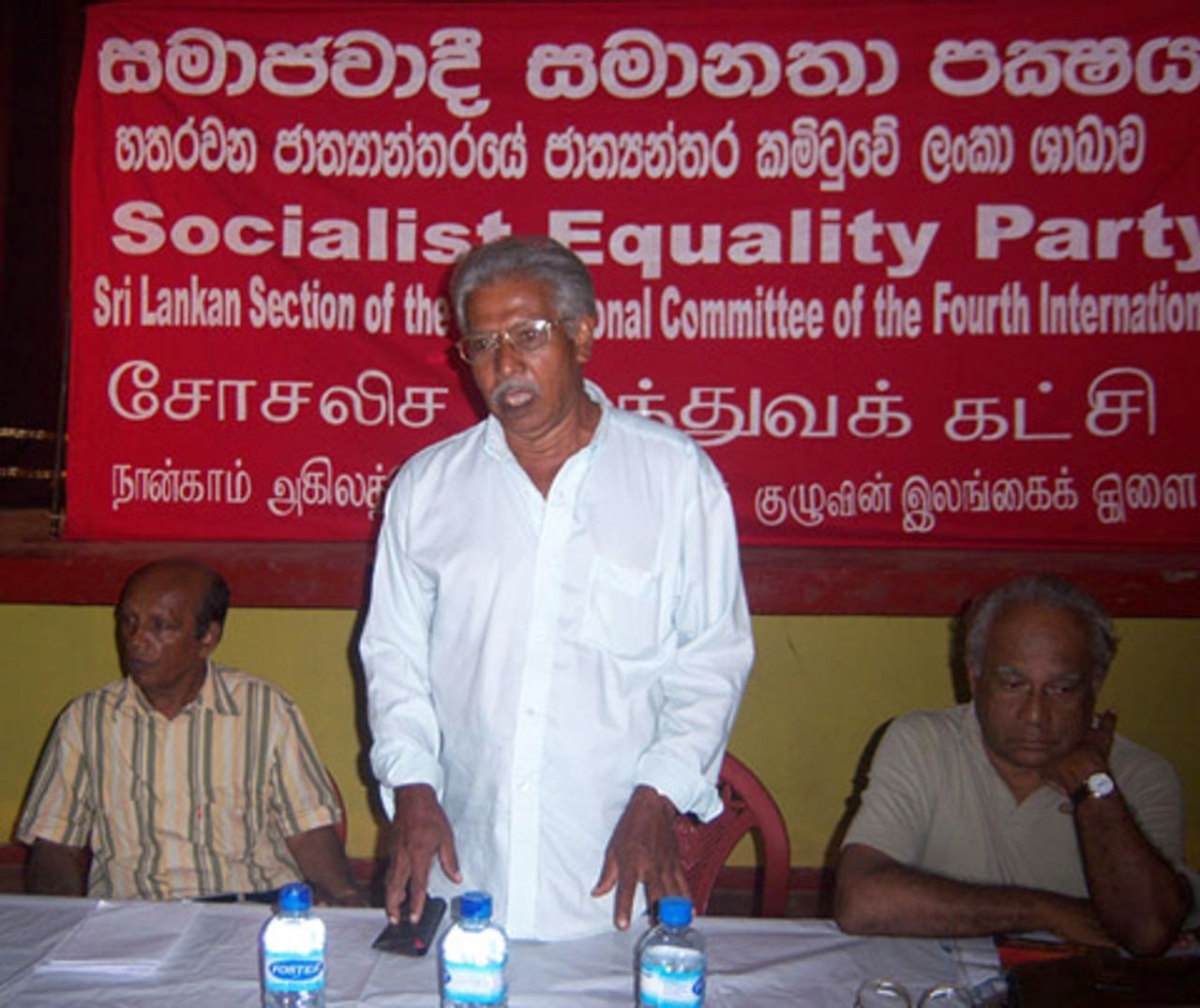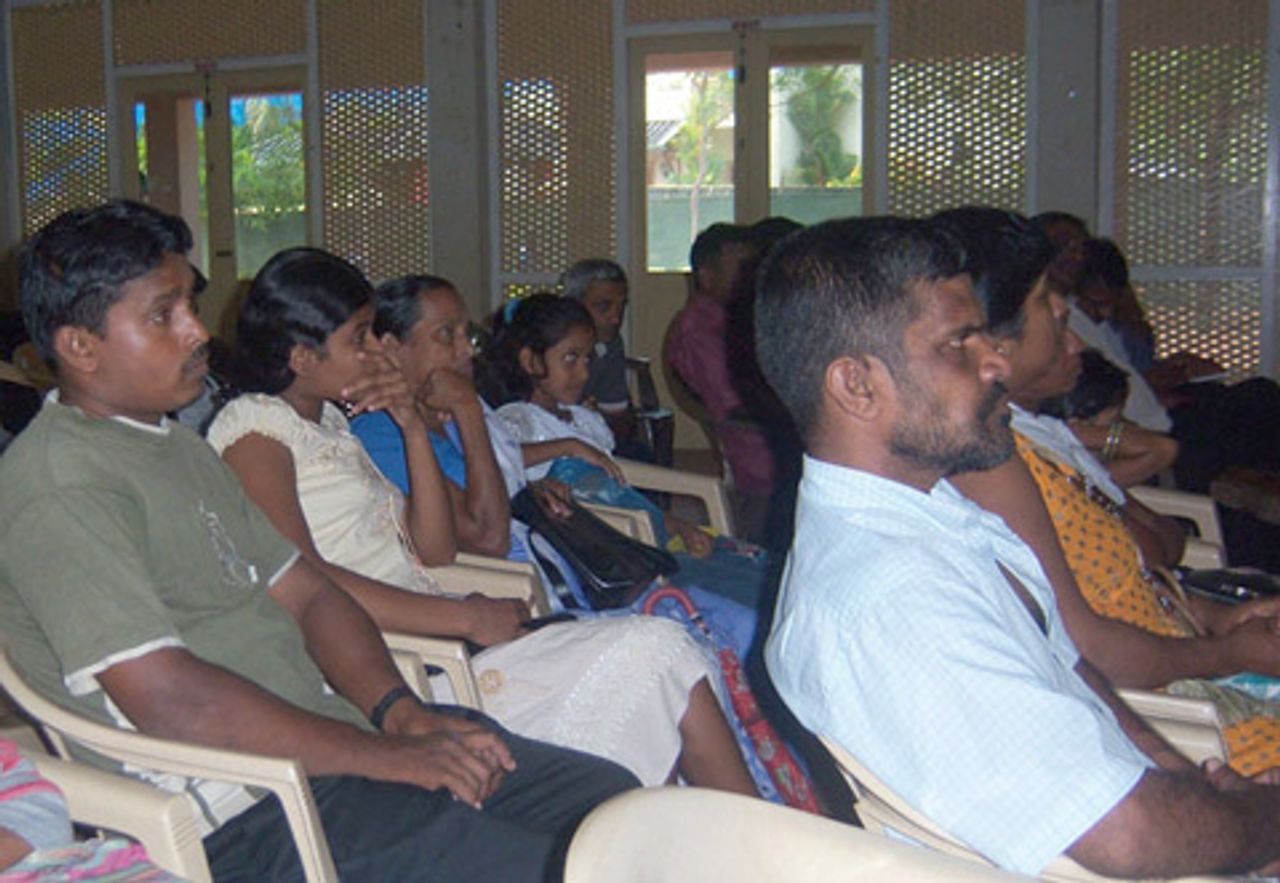The Socialist Equality Party (SEP) in Sri Lanka has intervened in the southern coastal town of Hikkaduwa and surrounding villages, including Udumulla, Thotagamuwa and Seenigama, as part of its campaign for the Southern Provincial Council elections on October 10. The SEP is running a slate of 26 candidates in the province’s Galle district.
Udumulla is one of the poorest communities in the Hikkaduwa area. Most men are forced to eke out an existence by fishing in a nearby small lake. Women derive some income from the manufacture of coconut-fibre string. For youth there are no jobs at all and many join the military. Seenigama and Thotagamuwa are small neighbouring villages.
The government and the media continually claim that support was strong for the communal war in southern Sinhalese villages against the separatist Liberation Tigers of Tamil Eelam (LTTE). Many villagers had hoped that their conditions would improve after the LTTE’s military defeat in May, but many are now asking, “Where is the promised alleviation?”
“All political parties are the same and I considered not voting this time,” a retired female teacher from Udumulla told the SEP. “I opposed the LTTE’s separate state demand. We hoped everything would be okay after the war but nothing has happened. How can we cope with the increasing price of everything, including rice, sugar and dhal? My pension is not enough to sustain the family.”
A.P. Gnanasiri, irrigation worker in Udumulla who guards a sluice gate, explained his working conditions: “Two of us are permanent and the rest are temporary hands. We have to work 12 hours without any overtime but my monthly wage is not enough for my family of four, including two daughters. I don’t even have enough money to buy an extra sarong (cloth) to change with the one I already have. Money has no value today.”
Gnanasiri said he opposed the LTTE separatist policies but added: “The war erupted because of capitalist governments’ policies against the Tamils. The Tamil people should be given their due rights.”
One SEP team met a housewife whose husband is in the navy and still in Jaffna. He joined the navy because he was unable to find a job in the area.
“I am not interested in this election at all,” she said. “The government wants people to vote, claiming that it had saved the country. But it is asking us to sacrifice for the country. How can we do that as life is getting harder and harder? We are also in a war, a war to live.”
Although she had passed the Advanced Level exams at school, she is unemployed. “The UNP [the opposition United National Party] wants us to vote for it and has promised that it will reduce price of goods. But everyone knows their past record.” She also criticised the Sinhala extremist Janatha Vimukthi Peramuna (JVP) for “saying one thing and doing another”.
As part of the campaign, the SEP held a meeting at the Lion’s Club Hall at Hikkaduwa on September 21 which was attended by several workers, housewives and youth. R. Amaratunga, a long-time SEP member and well-known in the area for fighting for socialist politics, chaired the meeting.
 R. Amaratunga
R. AmaratungaAmaratunga told the audience: “Although the government and opposition parties give bags of promises during the elections these are bound to go into the litter bins after the vote, just like in the past.” He said that the government was facing a deep economic crisis—a product of massive war spending and the heavy impact of the world economic crisis.
“During the last century,” he continued, “the world imperialist powers were involved in two world wars for global dominance when economic crises erupted. Today, the biggest crisis is developing since the 1930s Great Depression.”
Amaratunga said that President Rajapakse’s government was now using the military apparatus directed against Tamils during the war in the north and east against ordinary people. Having proclaimed “a war against the underworld”, the police now had a free hand to intimidate working people. He cited the recent killing in a Colombo suburb of two youth who were falsely accused of being connected with criminal gangs. Amaratunga noted similar experiences in the Ambalangoda area.
Ratnasiri Malalagama, who heads the SEP election slate, was the next speaker. “There is no difference between the conditions facing working people in the south and those of working people in other countries,” he told the meeting. “Fifty million have lost their jobs throughout the world this year and yet $US23.7 trillion has been provided to bail-out collapsed financial institutions. In Sri Lanka, 192,000 have lost their jobs due to factory closures and about 25,000 graduates are jobless.”
Referring to the situation in southern provinces, he asked: “What are the programs offered to the masses in the province by other political parties?” and then detailed their record in office.
“President Rajapakse’s ruling alliance is making promises about an unprecedented development in the province which the UNP is trying to match. But the Southern Province is the fourth-poorest province in Sri Lanka. According to a government survey, 24.3 percent farming families and 24.6 percent of non-farming families in this province are mired in poverty. The richest 20 percent draws 49.7 percent of wealth in the province while the poorest 20 percent draws only 5.4 percent,” he explained.
 A section of the Hikkaduwa meeting
A section of the Hikkaduwa meetingMalalagama stressed that the only solution for the working class, youth and farmers was through the development of the SEP and the fight for a socialist program.
The SEP and its forerunner, the Revolutionary Communist League, he said, had consistently opposed communal discrimination and the war against Tamils, demanded unconditional withdrawal of military from the north and east, and fought for the internationalist unity of the Sinhala, Tamil and Muslim workers as part of its struggle for socialist policies.
SEP Political Committee member Nanda Wickremasinghe began his speech by pointing out that the SEP’s involvement in the southern province elections was “part of a broad struggle to prepare working people and the oppressed masses for their historical task of socialist revolution.”
Explaining economic gyrations facing the Colombo rulers, he said that the government had been forced to obtain a bailout loan from the International Monetary Fund because Sri Lanka’s foreign reserves had dropped sharply as a result of the world financial crisis. These international loans were at a higher rate and were increasing Sri Lanka’s debt burden, which the masses would have to pay.
Wickremasinghe went on to explain the significance of the plantation workers’ wage campaign. “All working people should draw the necessary lessons from recent struggle of plantation workers. The fight today for even the most basic necessities raises the political question of confronting the government, the capitalist profit system and its state machinery.”
Wickremasinghe pointed to the pernicious role played by the plantation unions which aligned themselves with employers and imposed a poverty-level wage. “It is necessary to break from trade unions and prepare for political struggle,” he said. Plantation workers, he continued, had began to recognise that the unions were against them and had approached the SEP about establishing action committees through which they can take the struggle into their own hands.
The speaker explained that SEP’s fight for a workers’ and peasants’ government in the form of a Sri Lankan and Eelam Socialist Republic was the only alternative for working people. This perspective, he said, was part of struggle for international socialism, and invited workers and youth to join the SEP to build it as a mass party.
SEP campaigners were able to speak with some of those attending the meeting. Sunil, a Ceylon Electricity Company worker, explained the government’s restructuring measures.
“The real aim of restructuring the electricity board is to cut jobs and boost productivity,” he said. “Overtime is to be limited, and those who are about to retire are being persuaded to voluntarily resign with a payment of 400,000-500,000 rupees [$US3,482-$US4,353]. Most workers know that restructuring means privatisation, which will pave the way for increased exploitation.
“Workers don’t have faith in the trade unions and many have resigned. The trade union bureaucracy formed a joint union front then told us that it was not the right time to make demands on the government because it was engaged in the war [against LTTE]. Now they are silent. They have prevented workers from discussing their problems.”
Commenting on the provincial elections he said: “Some ruling party candidates get direct support from the president’s central government and are provided with government vehicles and military personnel for their campaigns. One candidate has given oil and tyres to three-wheeler taxi owners to freely campaign for him. That’s how they try to steal the election.”
